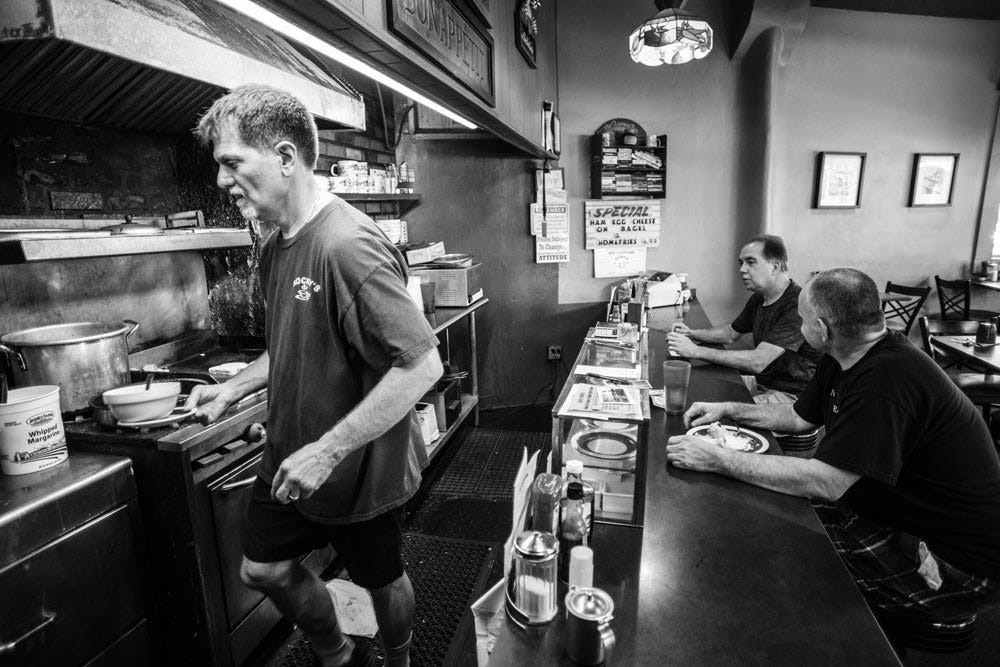A new installment of Hunted, an autobiographical account of God’s action in the life of a Vietnam War era radical activist. New to the series? This introduction provides context for the events described here. An index of other episodes, updated monthly, is also available.
The safety net I fell into at age 23, after my wife left me, wasn’t as comfortable as it could have been—two humid bedrooms in a cheap complex on the east side of Atlanta. Three of us fought for space in these cramped quarters, including Kirk, who scattered his laundry everywhere and never did dishes.
Looking back now, more than a half century later, I find it hard to believe that despite the squalor, I actually enjoyed living there. Like me, Kirk was a radical activist. On the big issues in life and society we thought alike. When I was around him I didn’t feel bad that my marriage was over. He had his own struggles with women. He’d broken up with his last girlfriend two years earlier, but he still called her late at night after he’d been drinking. Through the thin wall between our bedrooms I could hear him pleading and arguing, then the phone slamming down followed by a burst of obscenity or the thud of something hitting the wall. As bad as I felt about my own situation, I couldn’t feel too sorry for myself with Kirk in the next bedroom.
My other roommate, Jim, wasn’t a radical activist, but he too was a friend. He didn’t drink or throw things or call up an ex-girlfriend. He did his dishes when there was room in the sink, and he kept his half of the bedroom we shared tidy.
When the gloom and mess in the apartment were too much for us, Jim and I would go out for coffee. He was a big coffee drinker. So was I. At the nearby Waffle House coffee was a dime with unlimited refills. Long into the night Jim and I would sit hunched over the counter, marveling at the parade of eccentric, damaged, or down-at-the-heels customers mothered by long-suffering waitresses. The minutes passed slowly as we stretched out our reprieve from the chaos back home with desultory conversation about the foibles of odd people we’d known.
Jim had had a rough childhood. After being removed from his parents at age 7, he lived in a series of foster homes, passing from one to another until at age 10 when he finally landed with the Harmons, an elderly couple who knew how to manage him. He stayed with them till he graduated from high school and went into the Navy.
In the two years we’d been friends, he’d told me a lot about the Harmons, so it was natural for him to ask one Saturday morning if I wanted to take a ride out to visit them. Alone, divorced, finished with college, no longer as active in radical protest as I’d once been, I couldn’t think of anything better to do. A lot of my life was like that in those days. At the time it felt like I was drifting, waiting for the next thing to happen, but looking back now I can see that I was being prepared for something.
The Harmons lived in farming country about 40 miles southeast of Atlanta. To say I was apprehensive about driving out there would be an understatement. Farming country was ultra-conservative, and Georgia was full of people who didn’t much care for Yankees like me coming down from the North and stirring up trouble. Over the past year, I’d put that part of my life on pause, but I didn’t trust a cotton farmer with a chip on his shoulder from Civil War days to make that distinction.
It didn’t help that the Harmons were hard-core Baptists. In those days I hadn’t had a lot of experience with born-again Christians, but what I’d heard about them from my radical friends wasn’t encouraging. Jim said that because I was his friend, they probably wouldn’t ask too many questions about what I believed and didn’t believe. The “probably” didn’t fill me with confidence. I was bracing myself.
As Jim had warned, the Harmons really did live out in the middle of nowhere. After driving for miles through fields of corn and soybeans we turned onto an unpaved road that dead-ended at an unpainted cement-block house with a parched lawn.
Mrs. Harmon, a large white-haired woman in a print dress, came out to welcome us with an encouraging smile. I felt a little more at ease as we followed her into a hot little kitchen that smelled of coffee and bread baking.
At a small table covered with oilcloth sat a broad-shouldered man with wispy white hair combed over the top of his head. Jim’s foster father Roy had been a lay preacher, cotton-mill worker, and as a young man a union organizer targeted by the Klan as a troublemaker. Sitting down opposite him, I felt like I had slipped into a scene from the 1920’s. This was where things could get ugly if they were going to.
“You read your Bible every day?” Roy demanded when Jim introduced me. My heart sank I shot Jim a glance, but all I got was a shrug. I couldn’t just sit there and not answer, so I said I wasn’t as regular a Bible-reader as I should be. Roy chuckled. I wondered if he guessed the truth, that I wasn’t a Bible-reader at all. If he did, he seemed to take it in stride, because his piercing blue eyes wandered from mine.
“I been preaching the Lord’s word going on sixty years now,” he intoned. “Did Jim tell you? How we used to go down to the prison?”
I relaxed a little. We were back on familiar ground now. Jim had told me about the prison ministry. He vividly remembered those late-night rides in a battered old van with worn shocks. He had told me all about what it was like as a young boy being brought face to face with hard-bitten convicts.
“I seen some hard men in there, Charlie,” Jim said now, shaking his head at the memory.
“Hard men?” Roy shot back. “You ain’t seen no hard men. Not when you were with me. You ain’t seen the one cut up his wife with a hacksaw. I’d preach to that boy till the tears ran down his cheeks like a baby. ‘Turn back from Satan. Turn to the Lord while there’s still time. Ask Jesus to save you from the fires of hell.’”
His voice filled the small room. At some other time and place, this might have been awkward, but somehow it wasn’t. After getting a pass on Bible-reading, I knew all this wasn’t directed at me. Coming to the rescue, Mrs. Harmon told Roy to hush, we could all hear without him having to shout. “Why don’t you take Jim and Charlie out back and give this to the pig, and when you come back the biscuits will be ready.”
She handed him a metal bowl of scraps. He hoisted himself to his feet and led the way outside and around the back of the house. It felt like the back of beyond—undulating cornfields without end, not a tree or a road or a house or another human being in sight.
In a makeshift sty a huge sow lay slumped in the dirt. Roy clanked the bowl against the side of the sty, calling with a series of high-pitched shrieks: “Pig! Pig! Pig!” The pig didn’t move. Setting the bowl down, Roy gave Jim a long piece of wood and told him to poke her. Jim winced and shook his head, but complied.
“Harder!”
“She ain’t feeling it!”
Roy grabbed the stick from Jim and rammed it into the flank of the sow. With a snort the sow struggled upright, lumbered over to the side of the sty, and thrust her snout into the bowl Roy held out out to her. I glanced over at Jim, who looked on expressionless. It was an astonishing scene, but I guessed he’d seen it often enough over the years that it didn’t surprise him.
“That’s how you get ’em to move if they don’t come when you call.” Roy grinned and fixed me with those blue preacher’s eyes. I tried not to grin back, but with the sight of Jim in my peripheral vision, I couldn’t help myself. A seemingly random thought struck me: I had a lot to learn about born-again Christians. I never would have dreamed then that one day I’d be one.
Back inside, we helped ourselves to biscuits and mugs of watery coffee. While Roy busied himself with a biscuit, Mrs. Harmon gave Jim a long look and asked when he’d last been to visit his father.
Jim stiffened. She’d spoken kindly enough, but I knew all too well from our late-night Waffle House talks that this was a sore spot for him. He hadn’t seen his father since he went in the Navy. From his point of view, he had good reason not to. He was still bitter about his father not protecting him when he was a young child living at home. After the state put him in a foster home, he’d hardly ever seen his father or any of his other kinfolks. He guessed they could have come for a visit if they’d wanted to. Wasn’t nothing or nobody going to keep them away. As far as his father was concerned, he acted like Jim had fallen off the edge of the world. How could he possibly think he’d want to climb back on again now?
Crazy, for sure, but I could see how it made sense if you were caught up in his world. When he got talking like this, I would just listen.
“Mama,” he said now, “if my Daddy wanted to see me he could come find me. Don’t it seem like that to you, Charlie?”
“Now how’s he going to do that, Jimmy?” Mrs. Harmon persisted.
“I seen Uncle Carl and I gave him the phone number where I’m staying.”
“That don’t mean you can’t try to find him.”
“I got no idea where to look for him, Mama.”
Mrs. Harmon looked at me and shook her head sadly. Didn’t I know, she asked, that nothing good came of holding a grudge? She knew Jim was angry at Elmer. Why wouldn’t he be? The whole time Jim lived with the Harmons, Elmer only came to see him a couple of times. She didn’t know why Elmer wouldn’t come to the house. Maybe he thought he wasn’t welcome there. She hoped it wasn’t something she or Roy said that he took the wrong way. Whatever the reason, though, those times were long past. Did I know any good reason now why Jim couldn’t go see his father?
I shifted uncomfortably on the wooden chair. When I agreed to drive out here with Jim, I hadn’t expected to be caught up in the middle of something like this, stuck with questions I didn’t know answers to, questions which might even, if I thought about them too long, turn out to be applicable to my own life.
Mrs. Harmon’s kindly but insistent eyes were still on me, and I knew I wasn’t going to be let off without some sort of acknowledgment, so I shook my head no. Despite all our talks, I really couldn’t think of a good reason for Jim not to reach out to his father. All I could do now was hope that she wouldn’t press further and that Jim wouldn’t interpret that small shake of the head as betrayal.
She must have sensed my reluctance, or maybe she had just decided she’d pushed far enough for one visit. Whatever the reason, we moved on to less sensitive subjects. Now that the awkward topics of Jim’s father and Bible-reading lay behind us, it was actually quite peaceful to sit there in that little kitchen with these born-again Christians whom I’d been so apprehensive about meeting. It felt good not being put on the spot, not having to speak. Just at that moment I couldn’t think of any place that I’d rather be. I was drifting, yes, but all these years later I can see there was more going on. Something was changing in me that morning as I let the gentle conversation wash over me. Without realizing it, I was letting someone else take over the helm of my life, and whoever it was was speaking to me through these two simple people who had welcomed a stranger into their house.
Jim, though, didn’t find our experience there all that peaceful. The advice about seeing his father stuck in his craw, especially Mrs. Harmon’s warning about holding a grudge.
“Charlie, I get tired of people talking about me holding a grudge because I won’t hunt down my Daddy to the ends of the earth,” he said on the way home. “He don’t come and see me and I don’t go hunting for him. Does that sound like a grudge to you?”
That was a hard question. We had a long drive ahead of us. Many more lay ahead. I wasn’t going to be able to get away with just a shake of the head, as I had earlier. Now I had to figure out a tactful way to say what I thought, a way of explaining why I’d agreed with Mrs. Harmon earlier, even though I appreciated what he’d been through in childhood.
For a while I pondered this problem, until a quick, impatient glance from my friend told me I’d run out of time. Very hesitantly and slowly, I said I guessed if he was still angry at his father for not coming to see him when he lived with the Harmons, then he was holding a grudge, and if not he wasn’t.
I could tell he didn’t like hearing that. We rode in silence a few minutes. When he spoke again it was about other matters, but that didn’t mean he had led go of his anger. For the rest of the drive he was more irritable than I had ever seen him before—irritable about Kirk, irritable about his work in the cabinet shop, irritable that the Harmons lived so far from Atlanta and it cost so much to put gas in his car to get out there. I couldn’t think of anything more to do than just listen and be thankful that at least for the time being, none of it seemed to be directed at me.
The next day, to my relief, he was back to his old self again. When we returned to the subject of the Harmons over coffee at Waffle House, the anger had dissipated.
“Mama and Daddy mean well, Charlie, but here’s the problem. They got in their mind things got to go a certain way, and if not they don’t want to hear about it. I been on my own over five years, Charlie. I don’t need to be going through all that.”
He looked up at me anxiously, and I made haste to agree with him.
“You’re a good friend, Charlie. But you’re more than a friend. You’re my brother.”
I was taken aback. He was a good friend when I needed a friend, but apart from that we didn’t have a whole lot in common, except, of course, that I’d driven out with him to the back of beyond, watched a pig being fed, and been drawn into the dispute about not seeing his father. Maybe that was enough. I’d been there with him. I’d seen his life from the inside, as only a brother can do. But then again, maybe there was more to it than that. Maybe he had an inkling of what lay ahead for us. Maybe he sensed his need of me, and mine of him. Maybe he guessed what role we would play in each other’s lives in the future.







Ditto what Jennifer said!
Beautifully written. Looking forward to the next chapter!